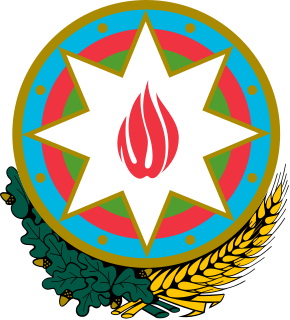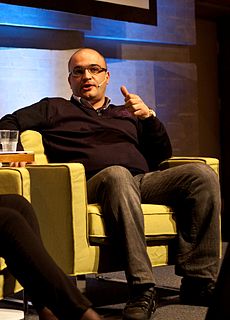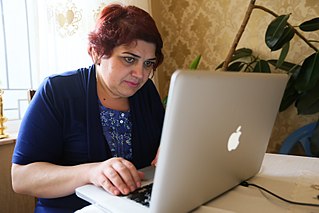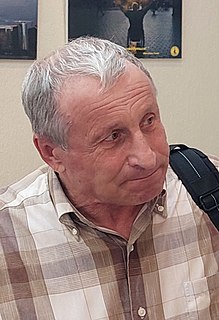
Radio Free Europe/Radio Liberty (RFE/RL) is a United States government funded organization that broadcasts and reports news, information, and analysis to countries in Eastern Europe, Central Asia, Caucasus, and the Middle East where it says that "the free flow of information is either banned by government authorities or not fully developed". RFE/RL is a private, non-profit 501(c)(3) corporation supervised by the U.S. Agency for Global Media, an independent government agency overseeing all U.S. federal government international broadcasting services. Daisy Sindelar is the vice president and editor-in-chief of RFE.

Radio Farda is the Iranian branch of the U.S. government-funded Radio Free Europe/Radio Liberty (RFE/RL) external broadcast service for providing "factual, objective and professional journalism" to its audiences. It broadcasts 24 hours a day in the Persian language from its headquarters in the district Hagibor of Prague, Czech Republic.

Human rights in Tajikistan, a country in Central Asia, have become an issue of international concern. The access to basic human rights remains limited, with corruption in the government and the systematic abuse of the human rights of its citizens slowing down the progress of democratic and social reform in the country.

International organizations have frequently alleged that Azerbaijan has violated human rights standards established in international law. Human Rights Watch issued a 2013 report accusing Azerbaijan of imprisoning and harassing political activists and human rights defenders. In 2019, Human Rights Watch called the situation of human rights in Azerbaijan "appalling", citing "rigid control" by the government, "severely curtailing freedoms of association, expression, and assembly", as well as "torture and ill-treatment" of journalists, lawyers, and opposition activists. According to Reporters without Borders, Azerbaijan ranks 167 of 180 countries on the Press Freedom Index. A 2020 report by the U.S. State Department accused Azerbaijan of a wide variety of human rights abuses, including "unlawful or arbitrary killing", "heavy restrictions on free expression, the press, and the internet", and "the worst forms of child labor".

Human rights in Armenia tend to be better than those in most former Soviet republics and have drawn closer to acceptable standards, especially economically. Still, there are several considerable problems.

Eynulla Emin oglu Fatullayev is an Azerbaijani journalist and editor-in-chief of the independent Russian-language weekly Realny Azerbaijan and Azerbaijani-language daily Gündəlik Azərbaycan newspapers. He was imprisoned for four years in Azerbaijan for his criticism of government's policies and for his comments on the Khojaly massacre. His sentence was condemned by Reporters Without Borders, International PEN, and the Committee to Protect Journalists, and Amnesty International named him a prisoner of conscience and 2011 "priority case."

A series of anti-government riots took place in Armenia following presidential elections held on 19 February 2008. Protests broke out in the Armenian capital Yerevan, organized by supporters of presidential candidate and former president Levon Ter-Petrosyan and other opposition leaders.

Nikol Vovayi Pashinyan is an Armenian politician serving as the prime minister of Armenia since 8 May 2018.

Tengiz Gudava was a Georgian author and human rights activist who was expelled from the Soviet Union in 1987 and worked for Radio Free Europe/Radio Liberty for 17 years. He died in Prague in 2009 under ill-defined circumstances.
Novruzali Khanmammad oğlu Mammadov was an Azerbaijani philologist, journalist and activist of Talysh ethnicity. He was the founder and editor of the now-defunct newspaper Tolyshi Sado. Mammadov also worked at the Nasimi Institute of Linguistics of the Azerbaijan National Academy of Sciences and headed a Talysh cultural center, which was closed after his imprisonment.

Ilham Heydar oghlu Aliyev is the fourth president of Azerbaijan, serving in the post since 31 October 2003.
The 2011 Azerbaijani protests were a series of demonstrations held to protest the government of President Ilham Aliyev. Common themes espoused by demonstrators, many of whom were affiliated with Müsavat and the Popular Front Party, the main opposition parties in Azerbaijan, included doubts as to the legitimacy of the 2008 presidential election, desire for the release of political prisoners, calls for democratic reforms, and demands that Aliyev and his government resign from power. Azerbaijani authorities responded with a security crackdown, dispersing protests and curtailing attempts to gather with force and numerous arrests.

Khadija Rovshan qizi Ismayilova, also Ismailova, is an Azerbaijani investigative journalist and radio host who is currently working for the Azerbaijani service of Radio Free Europe/Radio Liberty, until recently as the host of the daily debate show İşdən Sonra. She is a member of the Organized Crime and Corruption Reporting Project.
Most Azerbaijanis receive their information from mainstream television, which is unswervingly pro-government and under strict government control. According to a 2012 report of the NGO "Institute for Reporters’ Freedom and Safety (IRFS)" Azerbaijani citizens are unable to access objective and reliable news on human rights issues relevant to Azerbaijan and the population is under-informed about matters of public interest.

Leyla Islam qizi Yunusova, better known as Leyla Yunus, is an Azerbaijani human rights activist who serves as the director of Institute of Peace and Democracy, a human rights organisation. She is particularly known for her work helping citizens affected by forced evictions in Baku, on whose behalf she organized several small protests. In July 2014, the Azerbaijani authorities jailed Yunus under allegations of fraud and tax evasion, which are charges widely regarded as dubious. After being sentenced to 8.5 years in jail on 13 August 2015, Leyla Yunus was released on grounds of her deteriorating health on 9 December 2015, with a court converting her sentence into a suspended one.

Rauf Habibulla oghlu Mirgadirov is an Azerbaijani columnist and journalist. He has worked for the Baku based Russian-language newspaper Zerkalo. A believer in "citizen diplomacy" between Armenia and Azerbaijan over the Nagorno-Karabakh conflict, Mirgadirov was arrested for allegedly spying for Armenia and has been detained since April 2014. In December 2015, he was found guilty and sentenced to six years of prison. Following an appeal of his case, the ruling was upheld in March 2016, but Mirgadirov was released on suspended sentence.

Saparmamed Nepeskuliev is a freelance journalist who has contributed to Alternative Turkmenistan News, a human rights group based in The Netherlands, and Radio Free Europe/Radio Liberty, a U.S.-sponsored independent media organization under the Broadcasting Board of Governors. Until July 2015, he worked in Turkmenistan reporting on "poverty, official privilege, failing infrastructure, and deficient schools" when he was detained on July 7 at the Awaza resort by agents from the Turkmen National Security Ministry. As of July 13, 2016, he still remains in prison. According to Freedom House's 2016 report on Global Press Freedom, Turkmenistan is the second least press-free country in the world.

Caviar diplomacy is a lobbying strategy of Azerbaijan, consisting of costly invitations to foreign politicians and employees of international organizations to Azerbaijan at the expense of the host country. Caviar diplomacy also includes expensive gifts presented as "a tribute to the Eastern tradition."

Mykola Semena is a Ukrainian journalist who worked for Radio Free Europe/Radio Liberty (RFE/RL) in the mid-2010s.
Azerbaijan has been a member of the Council of Europe, an international organization that focuses on strengthening democracy and human rights, since 2001. As a member, it has attracted attention for holding political prisoners, low implementation of verdicts of the European Court of Human Rights (ECtHR), and bribing Council of Europe parliamentarians to suppress negative information about its human rights record. In 2017, the Committee of Ministers launched the first ever infringement proceeding against Azerbaijan after it refused to release opposition politician Ilgar Mammadov after a 2014 ECtHR verdict that his imprisonment was unlawful. There has also been criticism of Azerbaijan's continued membership by those who believe its lack of human rights protection undermines the credibility of the Council of Europe.
















